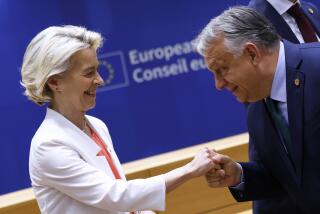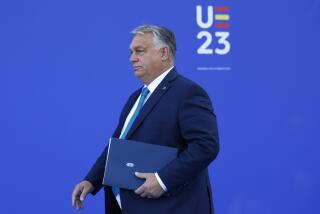Romanov Praises Hungary’s Economic Reforms, Hints Kremlin May Follow Suit
- Share via
BUDAPEST, Hungary — Soviet Politburo member Grigory V. Romanov on Tuesday expressed approval of Hungarian economic reforms that have brought an expansion of free enterprise and worker incentives, and he indicated that the Kremlin seeks some similar practices.
“Hungary has built a new world in close unity with the Soviet Union,” Romanov said in addressing Hungary’s 13th Communist Party Congress. “All that has been accomplished proves the correctness of our chosen road.”
Romanov has supported economic pragmatism, believed to be favored by the new Soviet leader, Mikhail S. Gorbachev. Romanov, 62, is considered one of the most powerful men in the Soviet hierarchy.
The Politburo member spoke in Russian and his comments were translated simultaneously for reporters who watched from the Congress Press Center over closed-circuit television.
Points of Emphasis
Speaking of Soviet economic “tasks ahead,” Romanov said emphasis must given to:
--”Further modernization of the economic mechanism.
--”The broadening of the . . . autonomy and responsibility of the companies.
--”The increasingly broad participation of the workers in the management of production and the more consistent application of the principles of remuneration, according to performance.”
In Hungary, state-run industries enjoy a great degree of autonomy and are increasingly geared toward profit. There are growing attempts to tie wages to performance.
A Hungarian political analyst, who spoke on condition he not be identified, said Romanov’s remarks pointed to a “ringing endorsement” of this country’s economic reforms.
‘The New Society’
Romanov called for increased exchange of “experiences about the construction of the new society.” He said the Soviet Union and Hungary should “mutually inform each other about the results in developing . . . economic management systems.”
Romanov also spoke on relations among Soviet Bloc Communist parties.
“There is no room for the imposition of one’s will on the other, for superiority and inferiority,” he said.
His statement apparently was intended to put Hungarian leadership at ease over Moscow’s reaction to its sometimes unorthodox policies.
In seeming reinforcement of this view, Romanov said, “However unique the concrete terms of a brotherly nation’s development . . . the achievement of successes is our deeply felt common concern.”
Romanov was interrupted by frequent applause as he spoke before a giant red-and-white banner declaring “Continuation on the Road of Leninism” at the newly built Congress Center. After his speech, he embraced Janos Kadar, the Hungarian leader who initiated the country’s reforms in the late 1960s.
He praised the 72-year-old Kadar in his speech as a “proven leader . . . and a personality of great respect” in Communist nations.
On superpower nuclear arms talks in Geneva, Romanov said the Soviets want to respond to “good will with good will and to trust with trust.”
But “all attempts aimed at negotiating from a position of strength through threats are doomed to failure,” he said.
More to Read
Sign up for Essential California
The most important California stories and recommendations in your inbox every morning.
You may occasionally receive promotional content from the Los Angeles Times.













